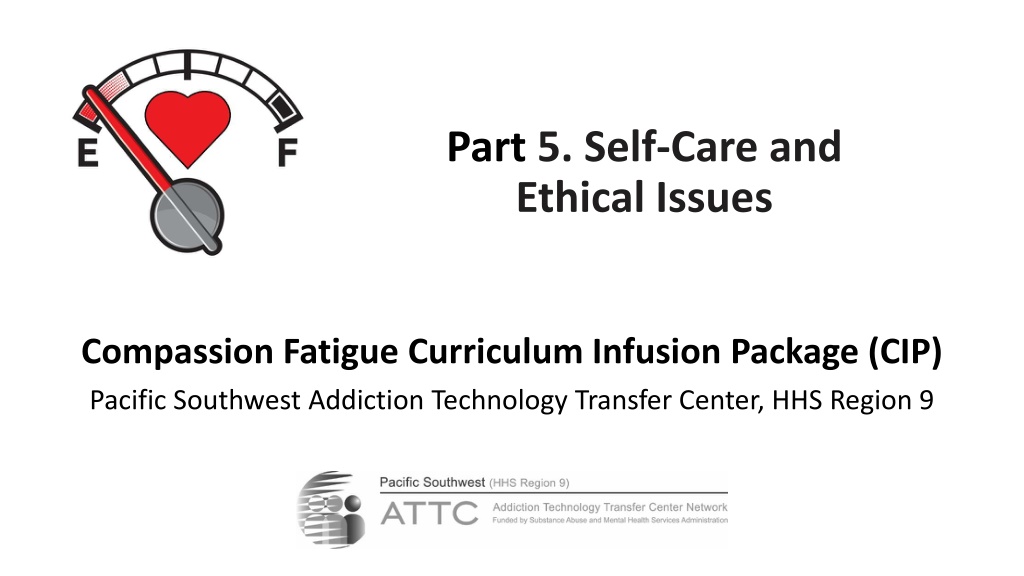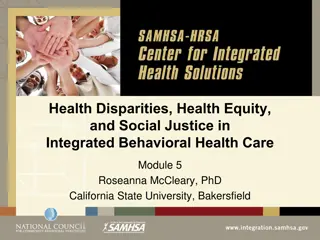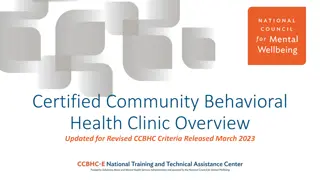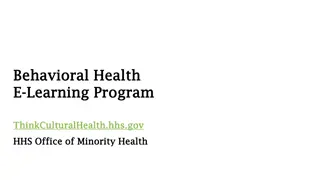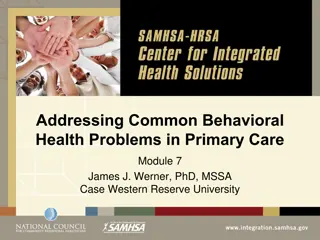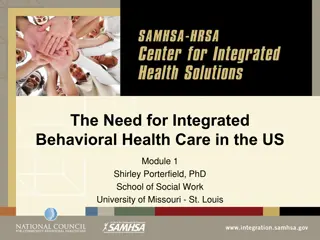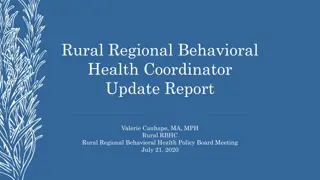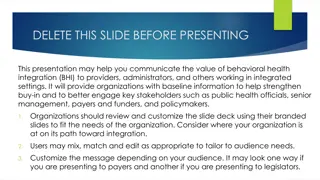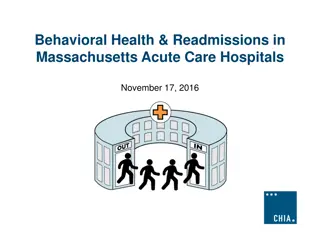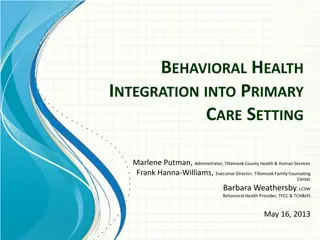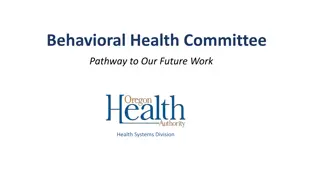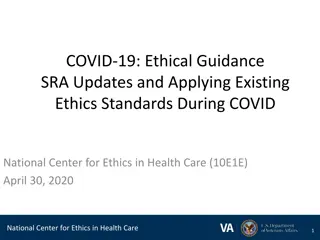Ethical Considerations in Self-Care for Behavioral Health Professionals
Exploring the ethical obligations of behavioral health professionals towards self-care to prevent compassion fatigue, this content sheds light on compassion fatigue, compassion satisfaction, and the importance of ethical codes in promoting self-care practices. By emphasizing the link between self-care and ethical principles, the narrative delves into the necessity of maintaining personal well-being to ensure the delivery of high-quality and ethical services in the behavioral health field.
Download Presentation

Please find below an Image/Link to download the presentation.
The content on the website is provided AS IS for your information and personal use only. It may not be sold, licensed, or shared on other websites without obtaining consent from the author. Download presentation by click this link. If you encounter any issues during the download, it is possible that the publisher has removed the file from their server.
E N D
Presentation Transcript
Part 5. Self-Care and Ethical Issues Compassion Fatigue Curriculum Infusion Package (CIP) Pacific Southwest Addiction Technology Transfer Center, HHS Region 9
Part 5 Outline Ethical Issues Is there an ethical obligation for behavioral health professionals to participate in self-care as a way to prevent compassion fatigue? Defining terms Equal Regard, Equanimity, and Conscientiousness Self-Reflection Questions Summary
When talking about self-care as an ethical issue, lets review these important terms - Compassion Fatigue & Compassion Satisfaction Compassion Fatigue is the emotional and physical fatigue experienced by professionals due to their chronic use of empathy in helping others in distress. (Figley, 1995; Newell et al., 2016; Stamm, 2010; Turgoose & Maddox, 2017) Compassion Satisfaction refers to those aspects of work that are rewarding and fulfilling to the human service professional. (Conrad & Keller-Guenther, 2006; Stamm, 2005) Providing help, kindness, empathy, and support can lead to compassion fatigue unless self-care plans, self compassion, and self-awareness activities are put in place.
Ethics, Compassion Fatigue, and Self Care Ethical principles state: First, do no harm and Do Good . In order to do no harm and to provide effective services behavioral health professionals should care for themselves to ensure quality, ethical services. (Figley, Huggard, & Rees, 2013)
Ethical Codes and their Relationship to Compassion Fatigue Currently, behavioral health professionals and students are more aware of their need (Obligation) to participate in self-care and it s link to ethical practices. (Newell & Nelson-Gardell, 2014) What does your profession s ethical code say specifically or indirectly about self-care? (Cox & Steiner, 2013; Newell & Nelson-Gardell, 2014) Does your profession s ethical code mandate assisting/reporting colleagues that may be suffering from compassion fatigue or, as Forster called it, moral stress? (Forster, 2009)
Self Care is an Ethical Issue? Owe the same duties to self as to others The American Nursing Association (2015) Code of Ethics for Nurses says The nurse owes the same duties to self as to others, including the responsibility to promote health and safety, preserve wholeness of character and integrity, maintain competence, and continue personal and professional growth (p. 19)
Self-Care as an Ethical Issue Two terms that reinforce self-care as an ethical issue Equal regard a notion that agape (disinterested universal love) requires people to love others neither more nor less than they love themselves. If the nurse operates from the ethical principle of self-sacrifice, self-care is much less likely to be a personal priority. (p. 276: a Christian term) Equanimity extending compassion to all sentient beings without being overwhelmed by emotional turmoil. (p. 276: a Buddhist term) Lachman, 2016; Pembroke, 2016
Another concept Conscientiousness attending to one s job or duties in a manner that is careful, attentive, thorough, and ethical has been found to be one of the best predictors of professionalism in health care practice (Burford, Carter, Morrow, Rothwell, Illing, & McLachlan, 2011)
Self-Reflection Instead of asking.. Do I have an impairment that is affecting my behavioral health practice? Ask Yourself the following types of behavior-oriented questions: Have I been showing up to work on time (or have I had a pattern of missing appointments or showing up late)? Have I been completing all my work tasks? Have I been completing my work tasks in a rigid or minimal manner? Barsky, 2015
Ask Yourself, have I been maintaining a professional appearance, including how I dress and groom myself? adhering to the highest principles of ethical practice (including maintaining client confidentiality, demonstrating respect for clients, and avoiding boundary violations)? following best practices and evidence-based interventions with clients? acting in a way that clients and co-workers can trust me as a reliable social worker? taking steps to continuously improve my competence and the effectiveness of my practice? Barsky, 2015
Activities that Help Promote Adherence to Ethical Codes & Manage Compassion Fatigue Self Reflection Questions Conscientiousness Self Care Plans Duty to clients/patients and duty to self
That which is to give light must endure burning Viktor Frankl Refueling of the light should be done regularly through self-care activities. Gentry & Baranowsky, 2013
This ends Part 5 of the five-part Compassion Fatigue and the Behavioral Health Workforce Curriculum Infusion Package (CIP) Parts 1-4 of this CIP can be found in the Products & Resources Catalog on the Pacific Southwest ATTC website: http://www.psattc.org
